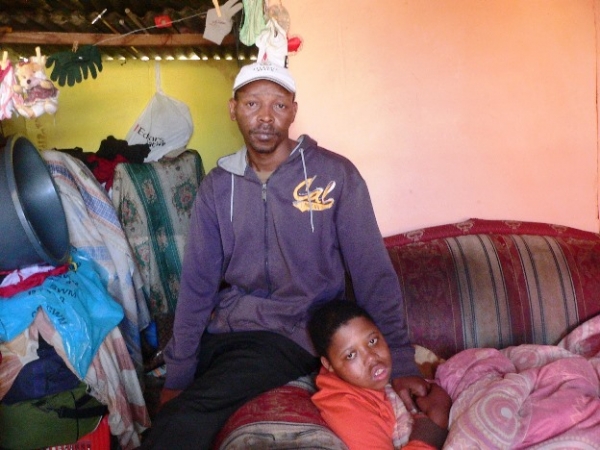

Siphokazi Rululu and her father Ayanda Qhara. Photo by Pharie Sefali.
9 June 2015
Siphokazi Rululu (14) and her father, Ayanda Qhara, both suffer from chronic epilepsy. Her mother leaves for work in a restaurant chain kitchen at 6am and returns at 7pm four-days a week. Siphokazi’s sister, who is seven years old, must sometimes care for her family during these times.
The family stay in a two-room shack in Site C surrounded by stagnant rain water. When GroundUp visited, Siphokazi was sleeping on a couch covered with blankets which had a musty, damp smell.
Qhara said that since Siphokazi cannot move due to her disability she spends the entire day on the couch and only moves when she needs to be cleaned.
Qhara describes his family situation as unbearable. He is worried about his children’s future and his hard-working wife.
“Every day I wake up and I make sure that I clean Siphokazi and prepare her younger sister for school because their mother leaves early for work,” he says.
“I used to be a security guard, but due to my illness I couldn’t continue and I had to take care of my daughters while their mother is at work. She is our only hope of survival.”
Qhara said that sometimes his younger daughter does not attend school because he has an epileptic seizure. His daughter knows that when this happens she has to call the neighbours.
“One day, myself and Siphokazi fainted at the same time and [luckily] my daughter was around. When we woke up, our neighbours were in the house and my daughter was crying because of the shock,” says Qhara.
Siphokazi used to attend a disability school in Khayelitsha but she was told to stay home because she was too sick and the teachers were not able to take care of her.
Both the daughter and the father get medication from a local clinic. Qhara says that they struggle at times because he has to carry Siphokazi to the clinic since she doesn’t have a wheelchair. Often he falls while carrying her.

The house where Qhara and his family live. Photo by Xolani Dywili.
“Sometimes it frustrates me when she is having her periods because I have to clean and change her all the time … Sometimes I have to let her mess herself, because it is far to go to the field, which we use as a toilet. And also the communal tap is far and in winter I have to cross a stream made by rain water to get to the tap and back,” says Qhara.
Qhara said that they have been living in these condition since 1996. Their shack has no electricity and is cold.
“Since we do not have electricity, a neighbour extended electricity from her house to ours so that we could have light.”
There are holes in the roof and water comes in through the bottom of the door on rainy days. Once the house flooded up to their knees. He fears that Siphokazi could even drown if she had an epileptic episode at such a time.
“Last year we used candles and one day both myself and my daughter got epilepsy more or less at the same time. One of us fell and hit a cupboard which had a candle on top of it. The shack was on fire and the neighbours came to rescue us, but not much was burnt,” says Qhara.
Xolani Dywili, a community leader in the area, said that the family’s circumstances are dire and as a community they are doing their best to assist. The community is organising a wheelchair. He wishes the family could be taken to a safe place or their living conditions could be improved.
Dywili said he is worried about the younger daughter who is still in school.
“A child should be outside playing, not inside the house worrying about siblings. Also the 14-year-old should be in school during school hours so that she can be taken care of,” said Dywili.